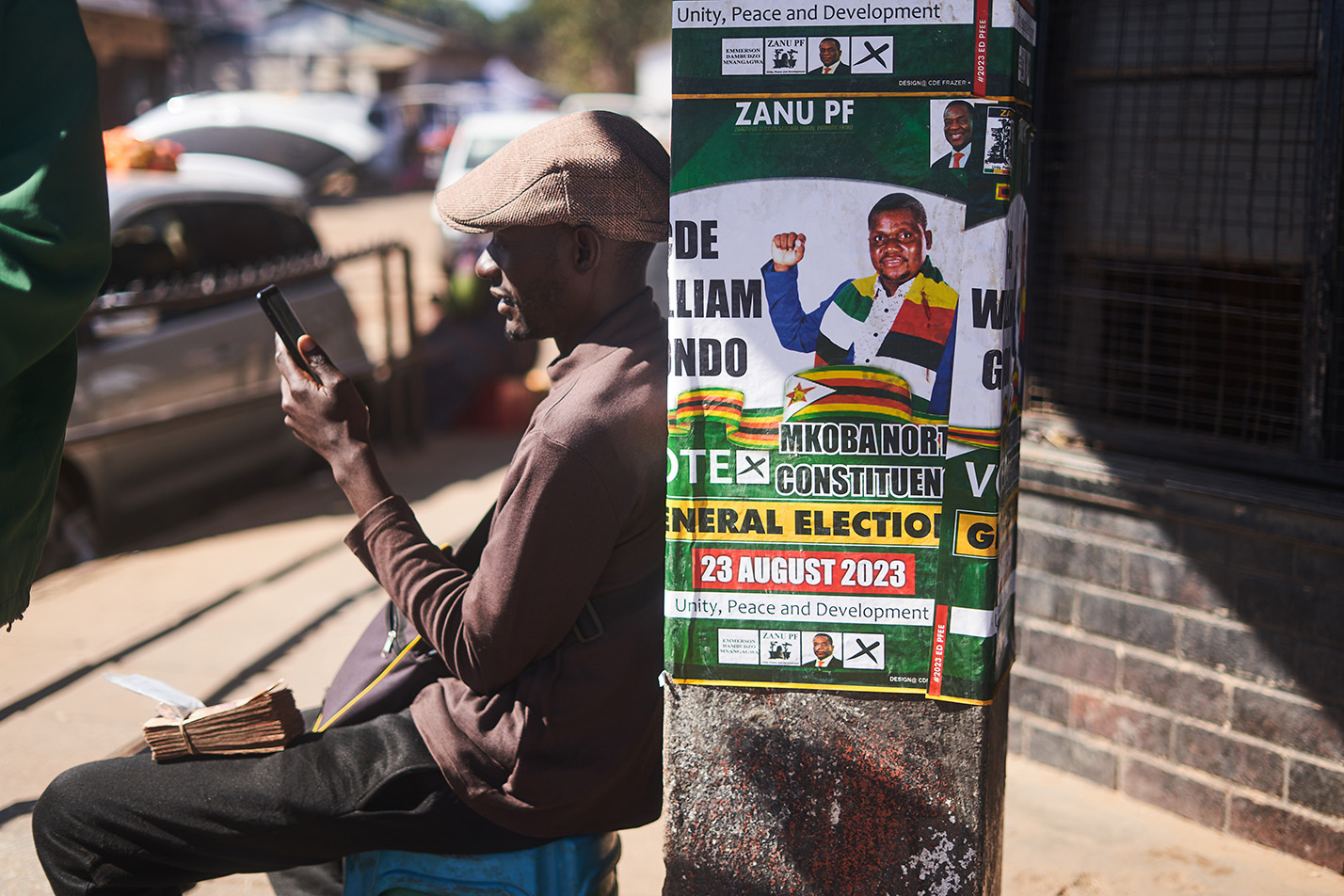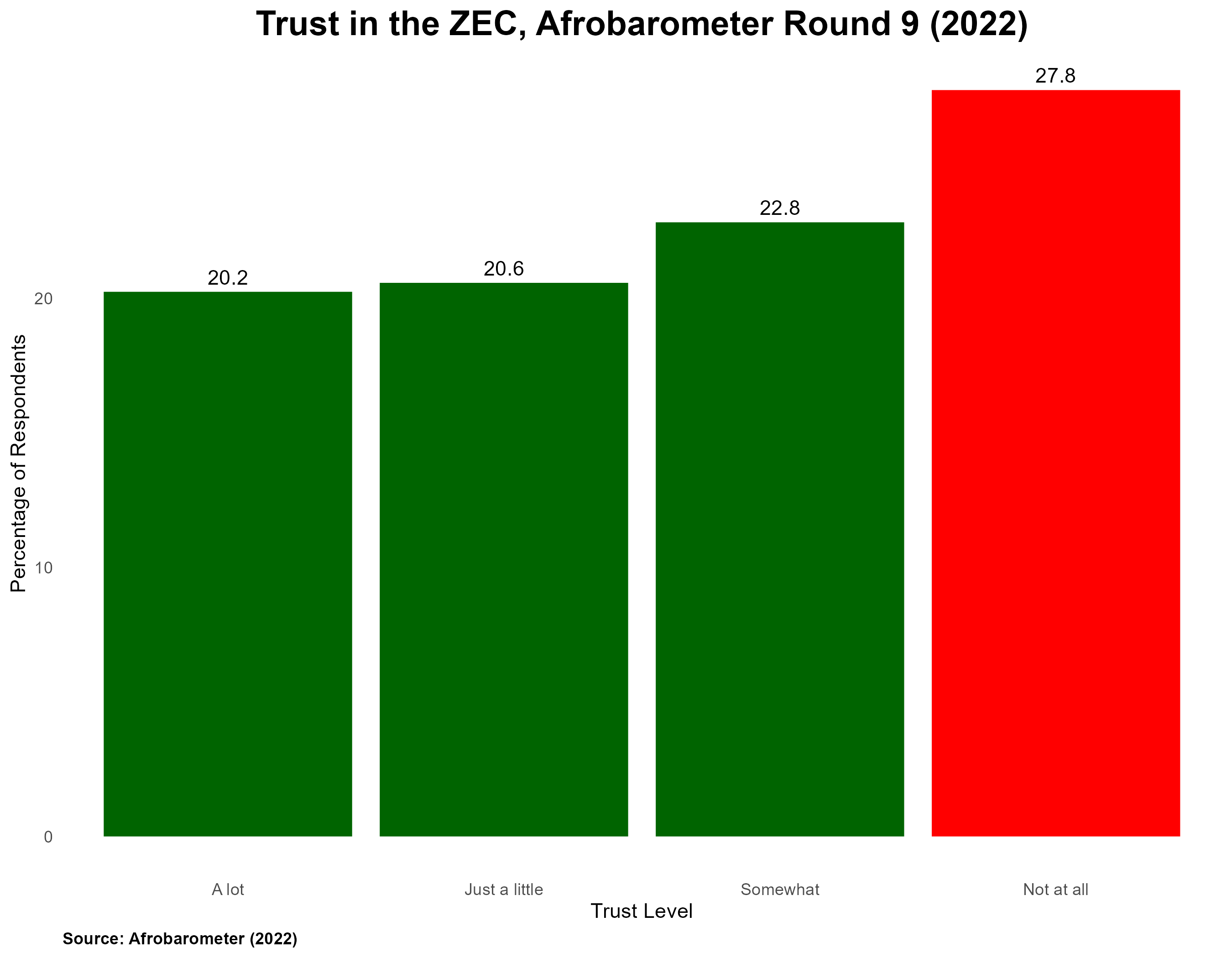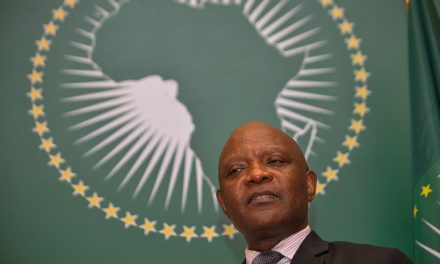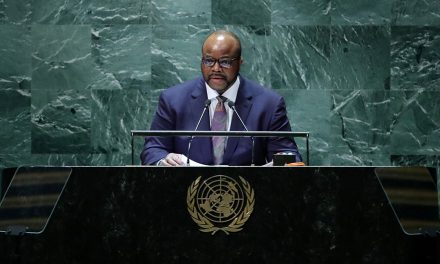Zimbabwe is preparing for its 23 August 2023 Harmonised Elections. It does so against the backdrop of a complex past, where the struggle for democracy and inclusivity has been marred by political instability, hardships, lack of meaningful electoral reforms, and a concerning track record of human rights violations and repression of freedom.

A man sits next to a poster of governing party ZANU PF ahead of the main opposition party’s Citizens Coalition for Change (CCC) campaign launch rally in Gweru, Zimbabwe, on July 16, 2023. Photo by Zinyange Auntony/AFP
In the aftermath of former President Mugabe’s ouster in a 2017 military coup, the 2018 elections were anticipated as a potential turning point for Zimbabwe’s democratic trajectory. However, the aspirations for a smooth transition towards democracy were met with disappointment. The Zimbabwe Electoral Commission (ZEC) came under scrutiny for its lack of transparency in decision-making and failure to engage in meaningful consultations with opposition parties during the pre-election period. This raised doubts about the body’s independence.
The situation worsened when the Constitutional Court dismissed a petition from the main opposition party at the time, the Movement for Democratic Change (MDC), contesting the 2018 presidential election results, further fuelling scepticism about the political autonomy of electoral institutions.
The MDC was subsequently infiltrated and divided by the ruling party, ZANU-PF, creating two factions. This eventually led to the MDC Alliance essentially becoming the Citizen’s Coalition for Change (CCC) led by Nelson Chamisa.
These lingering challenges from the 2018 polls, compounded by other factors, have evoked deep-seated apprehensions that the 2023 elections may once again be tainted by a multitude of electoral irregularities. The many rights violations, repression of freedom, irregularities within the electoral body, and accusations regarding the misuse of state resources for the ruling party’s gains are but a few of the factors fuelling such apprehensions.
Such concerns regarding the integrity of the electoral process have the potential to significantly influence voting behaviour and election outcome, which raises critical questions about the country’s journey towards a truly democratic future.
Utilising a host of nationally representative Afrobarometer surveys, which include Round 6 conducted between 2014 and 2015, Round 7 from 2016 to 2018, Round 8 in 2019/2021, and Round 9 in 2022, what voting patterns can we potentially see in the forthcoming elections in Zimbabwe?
One crucial finding from the Round 6 data is the impact of institutional quality on voter participation. Under Mugabe’s rule, Zimbabweans who lacked trust in the ZEC demonstrated a decreased likelihood of voting. Mugabe pushed a political agenda focusing on Zimbabweans that would vote in his favour, which led to informed resignation and distrust in the ZEC. This highlights the significance of ensuring a transparent and trustworthy electoral body and process in encouraging citizen engagement.
The significance is further amplified by ongoing disputes over the voters’ roll and delimitation report, as well as the appointment of relatives and loyalists of the ruling party’s politicians as election commissioners within the ZEC in 2022. This not only casts doubt on the impartiality and fairness of the electoral process but also raises concerns about potential voter disillusionment and a likelihood of lower voter turnout among segments of the population who perceive a lack of independence in the electoral body and other institutions like the judiciary.
Given instances of judges being offered housing loans and other favours, concerns have arisen about the judiciary’s independence, both in the lead-up to the elections and in their potential handling of post-election disputes.

Another consistent trend across all four rounds of Afrobarometer data is the lower voter turnout among the youth population (35 years and younger). While declining voter turnout and youth engagement in politics is a global phenomenon and not unique to Zimbabwe, this pattern is concerning and is likely to persist in the forthcoming elections.
Allan Chipoyi, the chairperson of Project Vote 263, a voter rights group, highlights that some young people aged over 18 are hesitant to register to vote due to their perception that the election is already rigged. This trend poses a potential challenge for the main opposition, the CCC, as the party heavily relies on the support of the youth.
Participation in political activities, such as attending political rallies and affiliating with a political party, has also shown a positive correlation with voter turnout in previous elections. Zimbabweans who actively participate in political discussions are also more likely to cast their votes. This suggests that political engagement plays a pivotal role in shaping citizens’ willingness to exercise their democratic rights and that more turnout can be observed if political parties continue to engage their supporters.
This finding holds significant implications for the CCC, especially considering the police decision to ban its political rally just six weeks before the elections. However, despite this setback, citizens appear undeterred and are actively participating in rallies.
Socioeconomic conditions have also influenced voting patterns in previous elections. Specifically, unemployment has been a significant deterrent to voter turnout, particularly during Rounds 6, 7, and 9. As Zimbabwe grapples with ongoing economic challenges, the imperative to address unemployment and improve living conditions cannot be overstated. These measures are critical for bolstering voter participation and rekindling faith in the democratic process.
With hyperinflation, mounting unemployment, threats to dump the US Dollar, and other economic challenges, largely exacerbated by decades of poor governance, it is very likely that unemployed Zimbabweans would be less inclined to participate in the upcoming polls. These factors are poised to play a pivotal role in shaping the electoral landscape as citizens navigate their concerns about their livelihoods and the country’s economic prospects.
Afrobarometer data from Round 6 also revealed a connection between engaging in bribery in accessing public services and reduced voter turnout. This finding underscores the importance of combatting corruption and promoting transparent governance, as citizens are more likely to engage in the electoral process when they trust the integrity of public institutions.
Round 6 of the survey also suggests a potential for higher voter turnout among Zimbabweans residing in rural areas in the forthcoming elections. The data revealed a significant pattern indicating that Zimbabweans living in rural communities were more likely to cast their votes compared to their urban counterparts. This observation holds immense significance for both ZANU-PF, given their robust rural support that could provide an advantage in the upcoming elections, and the main opposition party, the CCC, which enjoys strong urban backing.
Other interesting findings from rounds 7 and 9 include that Zimbabweans with higher levels of education were less likely to participate in past elections. This suggests that more educated citizens are increasingly aware of institutional deficiencies leading to reduced electoral engagement. Moreover, in round 9, conducted in 2022, Zimbabweans who feared political violence and intimidation exhibited lower voter turnout in the last election. This underscores the need to foster an environment that enables citizens to exercise their right to vote without fear in the forthcoming elections.
The importance of Zimbabweans actively exercising their constitutional right to vote in the forthcoming elections cannot be overemphasised. Lower voter turnout has the potential to significantly influence election outcomes in favour of the incumbent party. Without implementing mitigative strategies, the 2023 harmonised elections in Zimbabwe are likely to mirror the recurring adverse patterns observed in previous elections.
The concerning trend of anomalies within the ZEC warrants close attention, as it may impact voter trust and election outcomes. Addressing issues related to youth voter apathy, urban voter disengagement, unemployment, political violence and intimidation, and corruption remains critical for fostering greater citizen participation.
This article also appears on the Mail & Guardian.
Nnaemeka is adataanalyst andresearcher at Good Governance Africa. He completed hisMastersdegree in e-Science (Data Science) at the University of the Witwatersrand, supported byascholarshipfrom the South African government’s Department of Science and Innovation.Much of his research explores socio-politicalissues likehuman development, governance,disinformation,bias,andpolarisation, usingdata science andAItechniques.He has published research inscholarlyjournalslike Politeia, Journal of Social Development in Africa, and The Africa Governance Papers. He hasexperience working as a Data Consultant atDataEQ Consultingand teaching at the Federal University,Lafia inNigeriaand the University of the Witwatersrand in Johannesburg.












